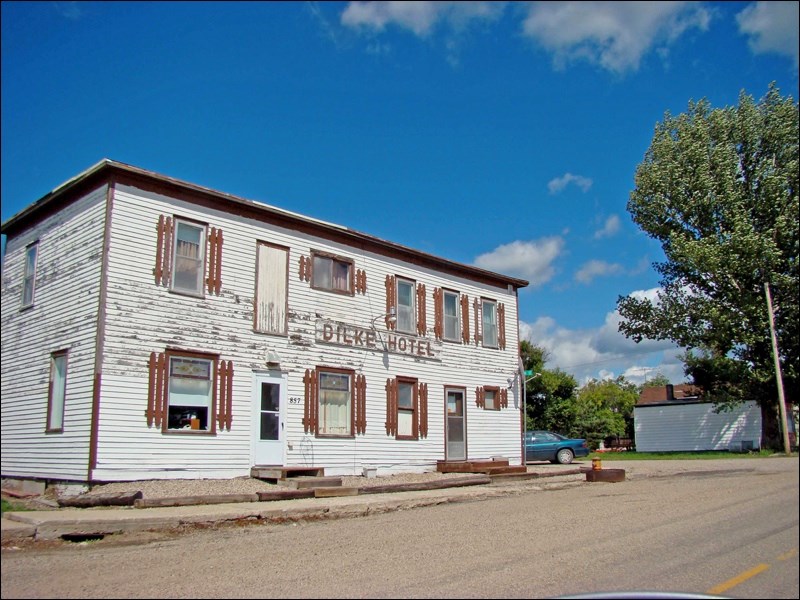“If you take a knuckle of beef, simmer it four hours, then throw in some barley, diced carrots, turnips, onions, celery, leaves as well, salt and pepper, you’ll have soup, but ten to one you won’t have soup like Mrs. George Daintree of Dilke makes,” writes Marjorie Jones in the Regina Leader-Post on March 8, 1946. “That’s her recipe for the kind of soup that has made her name a byword to the travelling public and she doesn’t mind giving it to you … The trick is knowing in just what way to put those ingredients together, but she has been at it since she was 17 and she knows.”
During the 40 years the Daintrees ran the Dilke Hotel, located between Chamberlain and Last Mountain Lake, it became well known for its hospitality – and for Mrs. Daintree’s cooking.
Eliza Dewar, born in Scotland in 1884, had started cooking as a kitchen maid on a large London estate. Eliza took lessons from a French chef who taught her the art of sauce making and was soon employed as a cook for another wealthy family.
Eliza met her future husband, George Daintree, in 1904. Born in London in 1883, George worked first as a furniture deliveryman, and then in a pub. Perhaps George met Eliza while delivering furniture to the home in which she worked, or perhaps they met in the pub. Whatever the case, the two fell in love. George came to Saskatchewan in 1905, and in June 1906 filed for a homestead north of Bethune. He proved up the homestead and received the land title in 1909. Eliza came to Regina in 1910 and married the man she hadn’t seen in six years.
In 1921, after 10 hard years of farming, George and Eliza traded their farm for the two-storey Dilke Hotel, built in 1909. The Daintrees and their two children, Robert and Gwendoline, operated the hotel for 40 years.
Gwen (Daintree) Bathgate provides an account of her parent’s experiences running the hotel in Dilke’s local history book, Ploughshares & Prairies Trails (1982): “Their days were long for there was much to do in serving the travelling public, washing, ironing, bed-making, preparing meals, bread-baking, dish-washing, lamps to fill, [lamp] chimneys to shine and wicks to trim and a large establishment to keep clean. Everyone had their jobs to do. Grandfather [Robert Dewar] cranked the washing machine, Grannie [Mary Jane Dewar] ironed, made beds and did dishes. Mother was the cook; Father was the waiter and cashier.”
Dilke was on the railway line between Regina and Colonsay, and in the 1920s, four trains went through the village – two in the morning and two at night. Commercial travellers made good use of this train service. Business grew so much that by 1924 the Daintrees found they could not keep up. The hotel laundry was sent across the street to the Chinese laundry, bread was bought, and extra help was hired.
The Dilke Hotel became a warm and friendly home, not just for the Daintree family, but for teachers, businessmen and students. Doctors and dentists used the hotel rooms to see their patients. A piano teacher gave lessons in the hotel dining room for many years. The kitchen was where the family entertained. “I remember Mother, Grannie and the Aunties sharing a cup of tea with their friends,” Gwen writes. “There wasn’t private home with a happier kitchen.”
Like many of Saskatchewan’s rural hotels, the Dilke Hotel catered to American hunters. George supplied a car for the hunters and either chauffeured them himself or hired a driver to take them to the hunting areas. “They require a lot of attention and keep us busy from three o’clock in the morning until they go to bed at night,” Eliza told the Leader-Post reporter in 1946.
The Daintrees sold the Dilke Hotel in 1962 and moved to Regina where Eliza passed away in 1967. George remarried in 1971 and died in December 1980 at age 97.



